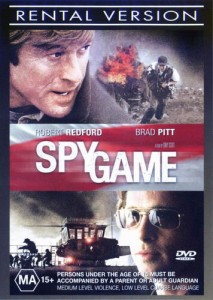Another bad week health wise for me, as I think I’ve caught a cold or flu or whatever has been floating around recently. 2009 hasn’t been a good year for me so far in terms of my health, starting the year right away with shingles, possibly had the swine flu last month, and now a cold when the last time I was this sick was ages ago. I have back pain too, just to add to discomfort. But as they say, ‘the blog must go on’. Or something like that. Good thing this week’s a bit quiet in terms of news, although still a couple of big stories to go through. And oh, the winners of Digital Digest’s 10th Anniversary competition has been drawn, and if you’re a winner, you should have gotten an email already – the full list of winners will be published here.

Let’s start with the copyright news for the week. There seems to be a lot of confusion as to the status of The Pirate Bay. They have lost a lawsuit and the site has been sold, but nothing has changed on the site, and the status of the sale itself is now unclear.
The lack of response to losing the lawsuit has the MPAA angry, and they have asked the court to address this. It was the co-founders of The Pirate Bay that was sued and prison term handed out, but the co-founders deny that have involvement with the company that actually owns The Pirate Bay, Reservella, which operates out of the Seychelles. The MPAA claims that Reservella is operated by the co-founders, and I don’t know how the sale of the site fits into all this, or even if the sale is still on. The allegation is that GGF, the company that purchased TPB, doesn’t have the money ready, but other sources suggest the sale will go through on the 27th of August (thanks to Cynthia for the news). In any case, the Italians also want a piece of The Pirate Bay lawsuit pie, and Italian anti-piracy agency FPM are planning to launch a $1.4 million dollar lawsuit against TPB. FPM were mentioned in last week’s WNR as they claim to have forced Mininova to remove 10,000 torrents.
And the story that keeps on giving. Amazon’s 1984 Kindle screw-up is now going to the courts, as a student who wrote his book reports notes lost his work too when Amazon remotely erased all traces of the unauthorised ‘1984’ Kindle e-book. See, this is what happens when you remotely delete stuff without people’s permissions – had some warning been given, I’m sure the kid could have salvaged at least part of his notes.
And it’s almost as if the RIAA and MPAA saw DRM in trouble, and wanted to step in to help defend it. In any case, a lawyer representing both the RIAA and MPAA has said that DRM’d content was never meant to be forever usable, and that consumers shouldn’t expect to be able to use what they paid for. In other words, the content owners are happy to take your money for overpriced digital downloads, infested with layers upon layers of DRM that makes compatibility a nightmare, and then they tell you that you shouldn’t have any expectations on having any access to the files in say 10 years time. See in the world that the RIAA and MPAA inhabits, this makes total sense and it’s not unfair to anyone at all. In the real world, I can still play audio and video tapes I bought back in the 80’s, people are still playing records bought in the 50’s and all your DRM-free MP3 files will still work in 20 years time, I’m willing to bet. And they wonder why people choose to pirate music.

Downloading a song costs $22,500 according to the RIAA, so no wonder Joel Tenenbaum pirated them instead
Although some will end up paying a lot more than having to deal with a music library that won’t work in 10 years time. The RIAA’s second trial against a music file sharer has resulted in another win, after the Judge in the case threw out defendant Joel Tenenbaum’s only line of defence, that what he was engaged in should be considered fair use (read the link to see what the Judge thought fair use might be). That’s not a defence I would have gone with, not if the RIAA already has evidence of file sharing and that total denial has been ruled out as a defence. Instead, I would question just how much money was lost to the RIAA and ask them to prove so (x number of copies shared times the revenue lost for every Y copies as not all people who download would have otherwise purchased). This would at least avoid the totally disproportionate damages being rewarded, in this case $22,500 per song for 30 songs, or $675,000 in total. And this is actually the more reasonable judgement of the two recent cases, compared to the $1.92 million in damages rewarded against Jammie Thomas-Rasset for only 24 songs. Doing a little math in my head, $1.92 million for 24 songs work out to be $80,000 per song. Now assuming each song costs $1 to buy on iTunes or whatever, then that means the RIAA claims that 80,000 copies of each song has been shared illegally. Assuming on average each song is about 3 MB in size, that means 240 GB of uploads. Now on my upload link (30 KB/s), which is fairly standard here in Australia, this task would take 2276 hours, or 94 days of continuous uploads while not using my connection for anything else. Now times that by 24 songs, and it would take 6 years of continuous uploads for Jammie Thomas-Rasset to rack up the amount of awarded damages (assuming she has the same connection as I do, so it may be “only” 3 years, or up to 12 years for her to do the same), and that’s not even taking into account that the content owners do not make $1 per song, as that’s the retail price.
Well at least they didn’t end up at Gitmo (or wherever the suspected terrorists will be moved to when it closes). Apple says that breaking the iPhone’s Apps DRM, to jailbreak the phones, could lead to hackers attacking cellular networks. This could then lead to possible use by terrorist, and the end of civilization as we know it. Either that, or Apple could lose the monopoly it has on iPhone apps, which could be just as devastating.
PC piracy is a serious problem. So is DS piracy. Game publisher Ubisoft says both are so serious that they have hatched plans to tackle both. What’s interesting is the two different approaches they have taken to tackle what appears to be the same problem. They are trying the carrot approach on the DS, by offering figurines and exclusive content on the DS versions of games. On the PC, while they haven’t spelled out their plans exactly, but it looks like they’re going to go with some kind of DRM system. Now why can’t they do the same on the PC as they are trying to do on the DS? I’m not talking about figurines, but add in some collectibles, some exclusive online content (even if it means online authentication), and make better use of the PC’s multi-purpose nature, by offering online community involvement, multimedia content and all sorts of goodies to make the stripped down pirated version seem inadequate (or so bloated in size when all the extras are included that it’s not worth downloading). In other words, make a better product or package. Making the games better themselves might also help.

On to HD news, Paramount is trying a new thing that many studios in the past have tried and found little success: tiered releasing.
What this means is that instead of releasing all home video versions of the movie at the same time, they’re going to release only the rental DVD and for sale Blu-ray version of the movies first, with the for sale DVD version coming at up to 8 weeks later. Now the theory behind this is to promote both video rental and Blu-ray, both of which are growing markets for the studios, as opposed to DVD which is quickly dropping in sales. Studios have tried this in the past, with rental versions of DVDs that contained no extra features, followed by retail versions with the lot (usually a second disc). This kind of thing died quickly here in Australia, as people wanted to rent the retail version with all the special features and were willing to wait. Having the Blu-ray version in stores will help Blu-ray certainly, but it will also task the sales people with explaining to customers why they can’t buy the DVD version until 8 weeks later, which I’m sure will please the retailers who rely on DVD for 90% of their home video revenue. And with people unable to buy the version they want, how many will seek alternative sources, such as pirated versions (of the rental only DVD), and feel justified in doing so because they have been denied the opportunity to purchase the content. Guilt is probably the most effective deterrent to piracy, and Paramount’s move might effectively destroy this last barrier. It’s good thing then that Paramount aren’t doing this with all releases, possibly just the lower profile titles that people will only ever want to rent, not buy.
LG HDTVs will now support the VUDU digital rental system. Not a very important piece of news, but one that continues the trend of integrating home electronics with digital distribution services.
![]()
And in gaming, the smoke intensifies around the possible PS3 Slim fire. The latest news is that Sony has ordered so many PS3 parts that it seems they are anticipating a huge surge in demand for the PS3, which might mean the PS3 Slim. There was also some news about an Amazon Germany listing for the PS3 Slim.
My thoughts are that Sony might have announced this at E3 if this was real, and that the additional parts orders may be because prices have dropped recently as demand drops due to the economy. But as I said last week, there’s too much smoke without fire, although it is a well known fact that video gaming fanboys, source of many of the rumours, are quite capable of producing mass amounts of smoke out of their a..
On that refreshing note, thus ends this week’s WNR. Congrats to those who won in our 10th anniversary competition, and better luck next time to those who didn’t. Don’t worry, there’s only 9 years and 336 days to go until the next decennial. See you next week.



